A recently published study has found that illegal transactions made using Bitcoin only account for a small fraction of all Bitcoin transactions. This report debunks the widely-reported narrative that Bitcoin is mainly used to conduct illegal transactions.
Details Of The Report
According to a study published by the National Bureau of Economic Research, illegal BTC transactions only account for 3% of all transaction volumes on the BTC network. The study found that starting from 2015, 75% of BTC transactions were conducted via exchanges or exchange-like entities. These include OTC desks, online wallets, and large institutional traders. Illegal transactions were classified as those involving scams, gambling, and illegal transactions.
The study also found that most of the transactions in exchanges were generated by cross-exchange flows. This was explained by the state of the crypto market, which consists of many non-integrated exchanges. The result is that traders often trade BTC across numerous platforms to take advantage of the price differences on these platforms via arbitrage trading.
Past Studies Overestimated The Volume Of Illegal Transactions
In the study, the two authors Igor Makarov, and Antoinette Schoar from the London School of Economics and the MIT Sloan School of Management respectively, demonstrated that past studies had largely overestimated the volume of illegal BTC transactions. They pointed to a 2019 study that found that 46% of all Bitcoin transactions were for illegal purposes.
They debunked the study by stating that in the 2019 study, researchers did not account for exchange-related volumes. By including exchange-related transactions, the fraction of illegal transactions drops significantly.
The researchers also pointed out that the 2019 study classified all illegal clusters as illegal transactions. They incorrectly concluded that every transaction within such a cluster is illegal if a majority of the transactions were previously classified as illegal.
The Drivers Of Transaction Volumes
In their study, the authors incorporated data from exchanges, OTC desks, and trading desks. Analysis of the data led them to conclude that exchange-related transactions accounted for 75% of total volumes. They found that other entities only accounted for a small fraction of total volume as of the end of 2020.
Concerns Regarding Centralization Of BTC
In the study, the authors stated that the BTC is still highly concentrated in the hands of a few investors. They also found that BTC mining was concentrated in a few regions. Consequently, they found that BTC is still susceptible to systemic risk. As a result, any gains in BTC will fall disproportionately to a small set of network participants.
Summary
In the study, the authors agreed with the general concerns regarding the pseudonymous nature of the BTC network. However, they added that it was important to understand what drives Bitcoin transaction volumes. In their conclusion, a majority of transactions were driven by speculation and not illegal transactions.
Notice: Information contained herein is not and should not be construed as an offer, solicitation, or recommendation to buy or sell securities. The information has been obtained from sources we believe to be reliable; however, no guarantee is made or implied with respect to its accuracy, timeliness, or completeness. Authors may own the cryptocurrency they discuss. The information and content are subject to change without notice. Visionary Financial and its affiliates do not provide investment, tax, legal, or accounting advice.
This material has been prepared for informational purposes only and is the opinion of the author, and is not intended to provide, and should not be relied on for, investment, tax, legal, accounting advice. You should consult your own investment, tax, legal, and accounting advisors before engaging in any transaction. All content published by Visionary Financial is not an endorsement whatsoever. Visionary Financial was not compensated to submit this article. Please also visit our Privacy policy; disclaimer; and terms and conditions page for further information.
